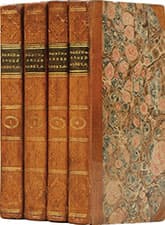Northanger Abbey
CRITIQUE | THE TEXT
 Northanger Abbey and Persuasion in four volumes, 1818
Northanger Abbey and Persuasion in four volumes, 1818First publication
1817
Written
1794–1799, revised 1803
Literature form
Novel
Genres
Literary, satire, romance
Writing language
English
Author's country
England
Length
Approx. 78,000 words
Notable lines
First lines
No one who had ever seen Catherine Morland in her infancy would have supposed her born to be an heroine. Her situation in life, the character of her father and mother, her own person and disposition, were all equally against her.
Passages
To look almost pretty is an acquisition of higher delight to a girl who has been looking plain for the first fifteen years of her life than a beauty from her cradle can ever receive.
But from fifteen to seventeen she was in training for a heroine; she read all such works as heroines must read to supply their memories with those quotations which are so serviceable and so soothing in the vicissitudes of their eventful lives.
"Oh! It is only a novel!" replies the young lady, while she lays down her book with affected indifference, or momentary shame. "It is only Cecilia, or Camilla, or Belinda"; or, in short, only some work in which the greatest powers of the mind are displayed, in which the most thorough knowledge of human nature, the happiest delineation of its varieties, the liveliest effusions of wit and humour, are conveyed to the world in the best-chosen language.
A woman, especially if she have the misfortune of knowing anything, should conceal it as well as she can.
"No man is offended by another man’s admiration of the woman he loves; it is the woman only who can make it a torment."
"The person, be it gentleman or lady, who has not pleasure in a good novel, must be intolerably stupid."
Last line
To begin perfect happiness at the respective ages of twenty-six and eighteen is to do pretty well; and professing myself moreover convinced that the general’s unjust interference, so far from being really injurious to their felicity, was perhaps rather conducive to it, by improving their knowledge of each other, and adding strength to their attachment, I leave it to be settled, by whomsoever it may concern, whether the tendency of this work be altogether to recommend parental tyranny, or reward filial disobedience.
— Eric
CRITIQUE | THE TEXT


